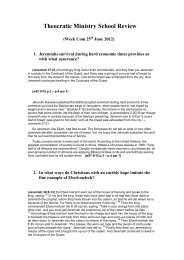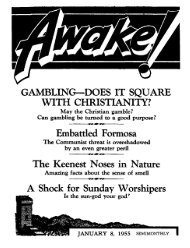1964 Awake! - Theocratic Collector.com
1964 Awake! - Theocratic Collector.com
1964 Awake! - Theocratic Collector.com
You also want an ePaper? Increase the reach of your titles
YUMPU automatically turns print PDFs into web optimized ePapers that Google loves.
fled to America saw to it that in the new<br />
land Church and State were separated.<br />
Consequently, no single denomination was<br />
favored by the State, and the way was prepared<br />
for many denominations to arise.<br />
Furthermore, the Calvinistic organization<br />
of the church had an educational effect on<br />
the people toward democracy and tolerance,<br />
and in this way too it contributed to<br />
the American Constitution and the great<br />
personal freedoms that this guarantees. Although<br />
the church discipline internally<br />
often expressed itself as intolerance of the<br />
worst sort, externally Calvinism has shown<br />
great tolerance and, with its Bible view,<br />
made room for greater individualism than<br />
Lutheranism. That is why the many denominations<br />
and sects have <strong>com</strong>e mainly<br />
from the reformed churches.<br />
No doubt you can point out reformed<br />
churches that have little resemblance to<br />
the picture we have just sketched. That<br />
is because many different circumstances<br />
made themselves felt in time and modified<br />
the characteristics of the churches more<br />
or less. Only the group that adhered to the<br />
original view of the Bible as God's Word<br />
and in which each member through diligent<br />
study of the Bible let himself be filled<br />
with the power of this Word would be the<br />
one that remained untouched by the world<br />
and its materialistic and faith-destroying<br />
philosophy. Calvin's reformation and Bible<br />
view were able to prepare the way for<br />
such a true Christian church. Now let us<br />
see what Luther's reformation and Bible<br />
view led to.<br />
Luther's Reformation<br />
Hundreds of years before Luther, lay<br />
movements such as the Catharis and Waldenses<br />
came to see the distance between<br />
the original Christianity and that of the<br />
Church of Rome. What characterized these<br />
humble people was a strong moral sense<br />
supported by diligent Bible study. The Bi-<br />
12<br />
ble was their standard for doctrine and<br />
life. The same stand was taken by John<br />
Wycliffe in England and John Huss in Bohemia.<br />
Of these preparations to the Reformation,<br />
one historian says: "Since the<br />
time of the Waldenses, Wycliffe and Huss<br />
there were men who by reading the Ancient<br />
Scriptures got to see the Truth and<br />
the Way in a simple and literal observance<br />
of the words of Jesus. These 'dangerous'<br />
writings had now been distributed through<br />
printed translations into thousands of<br />
hands that in believing sincerity grabbed<br />
hold of the lifegiving food.'"<br />
It was not necessary for Luther to produce<br />
new evidences or new doctrines in<br />
order to start the Reformation. And, in<br />
fact, he did not do it either. "During all the<br />
reformation <strong>com</strong>motion there was hardly<br />
expressed one thought which was not<br />
already thought by Wycliffe one and a half<br />
centuries previously."" Luther spoke only<br />
the word for which everybody had been<br />
waiting, and this he did with his protest<br />
against the selling of indulgences in 1517.<br />
The people eagerly accepted his words<br />
about the Christian's freedom and independence<br />
of the pope, church council or any<br />
other authority; the Bible alone was to be<br />
his guide. The teaching that a man will<br />
not be justified by works but by faith alone<br />
also fell on fertile ground. In order to prevent<br />
what was now in process-that people<br />
unrestrainedly began to split up into more<br />
or less fanatic and political and revolu·<br />
tionary movements or, in reliance on God's<br />
forgiveness, began to ignore morals and<br />
good conduct <strong>com</strong>pletely-Luther thought<br />
that he had to stress the virtue of obedience<br />
toward the worldly authorities, and<br />
this he did to such a degree that the pontical<br />
prince or king became the head of the<br />
church.<br />
In addition, Luther set bounds for the<br />
freedom to interpret the Bible. He taught<br />
that only those words in the Bible that<br />
AWAKEI




